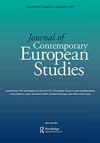欧盟资金和前共产主义成员国的腐败
IF 1.8
3区 社会学
Q1 AREA STUDIES
引用次数: 0
摘要
摘要本文采用面板自回归分布滞后(ARDL)方法分析了欧盟资金对欧盟前共产主义国家腐败的影响。该小组包括2007年至2019年期间的10个前欧盟共产主义国家。主要研究结果表明,从长远来看,欧盟资金支付和吸收率的提高可以降低欧盟前共产主义国家的腐败程度。这是因为与国家资源相比,欧盟支付的资金得到了更好的监控,欧盟资金吸收渠道也更加高效和公平。与欧盟基金一样,腐败也可以在一定条件下受到经济发展程度、政府规模、民主化程度和宗教信仰的控制。关键词:腐败欧盟基金小组分析前共产主义国家影响披露声明作者未报告潜在的利益冲突。数据可用性声明支持本研究结果的数据可在[ecrg]中找到。[ecrg.ro/dataset.xlsx],参考编号[不适用]。这些数据来自下列公共领域的资源:《世界治理指标》和《世界发展指标》(世界银行在线数据库);欧洲委员会DG REGIO在线数据库;欧盟统计局在线数据库;美国传统基金会在线数据库;经济学人智库经济学人集团在线数据库;宗教数据档案协会在线数据库。样本只包括整个考虑时期的欧盟成员国(即克罗地亚不包括在样本中,因为该国在2013年成为欧盟成员国)。许多其他修订已经完成,值得注意的是2017年7月17日的法规(EU) 2017/1371 (EU Regulation Citation2017)和2018年7月18日的法规(EU, Euratom) 2018/1046 (EU Regulation Citation2018)。经过多年的调查,OLAF在2022年报告:256项调查结束;275项财政、司法、纪律和行政建议;4.268亿欧元建议用于恢复;开展192项调查;1017次选择;防止1.979亿欧元的损失(OLAF, Citation2022)。其中,匈牙利、波兰和罗马尼亚占据了调查的前五位。本文章由计算机程序翻译,如有差异,请以英文原文为准。
European Union funds and corruption in the ex-communist member states
ABSTRACTThe paper analyses the impact of European Union (EU) funds on corruption in the EU ex-communist countries by following a panel Autoregressive Distributed Lag (ARDL) approach. The panel includes 10 former EU communist countries, over 2007–2019. The key findings reveal that an improvement in the EU funds paid and their rate of absorption can reduce the level of corruption in the long-run in the recipient EU ex-communist countries. This is due to better monitoring of EU funds paid compared with national resources, and a more efficient and fairer channel of EU funds absorption. In parallel with the EU funds, corruption can be controlled in certain conditions by the degree of economic development, size of government, level of democratisation and religiosity.KEYWORDS: CorruptionEU fundspanel analysisex-communist countriesimplications Disclosure statementNo potential conflict of interest was reported by the author(s).Data availability statementThe data that support the findings of this study are available in [ecrg.ro] at [ecrg.ro/dataset.xlsx], reference number [not applicable]. These data were derived from the following resources available in the public domain: Worldwide Governance Indicators, and World Development Indicators (World Bank online database); European Commission DG REGIO online database; EUROSTAT online database; Heritage Foundation online database; Economist Intelligence Unit of the Economist Group online database; Association of Religion Data Archives online database.Notes1. The sample includes only the countries being EU members whole considered period (i.e. Croatia is not included in the sample, as that country became EU member in 2013).2. Many other amendments have been done, notable being the Regulation (EU) 2017/1371 of 17 July 2017 (EU Regulation Citation2017), and Regulation (EU, Euratom) 2018/1046 of 18 July 2018 (EU Regulation Citation2018).3. After years of investigations, OLAF reports in 2022: 256 investigations concluded; 275 financial, judicial, disciplinary and administrative recommendations; 426.8 mil. Euro recommended for recovery; 192 investigations opened; 1017 selections made; and 197.9 mil. Euro prevented from being lost (OLAF, Citation2022). Herein, Hungary, Poland and Romania occupy the top five of investigations.
求助全文
通过发布文献求助,成功后即可免费获取论文全文。
去求助
来源期刊

Journal of Contemporary European Studies
Multiple-
CiteScore
2.70
自引率
7.70%
发文量
84
期刊介绍:
The Journal of Contemporary European Studies (previously Journal of European Area Studies) seeks to provide a forum for interdisciplinary debate about the theory and practice of area studies as well as for empirical studies of European societies, politics and cultures. The central area focus of the journal is European in its broadest geographical definition. However, the examination of European "areas" and themes are enhanced as a matter of editorial policy by non-European perspectives. The Journal intends to attract the interest of both cross-national and single-country specialists in European studies and to counteract the worst features of Eurocentrism with coverage of non-European views on European themes.
 求助内容:
求助内容: 应助结果提醒方式:
应助结果提醒方式:


